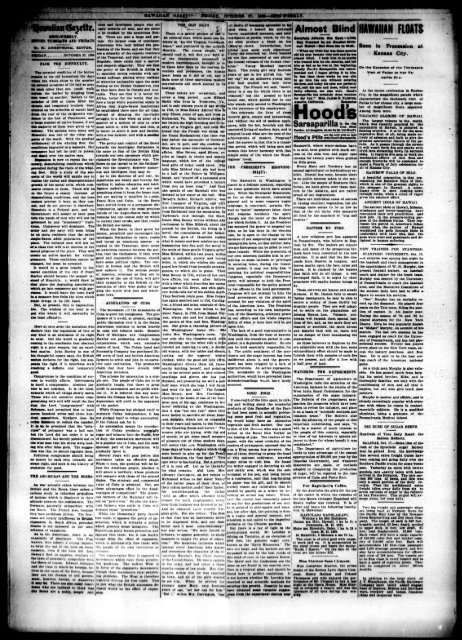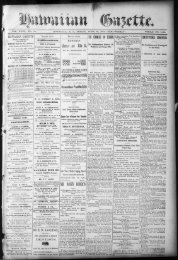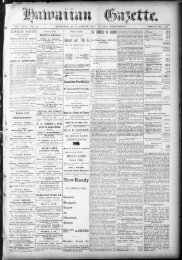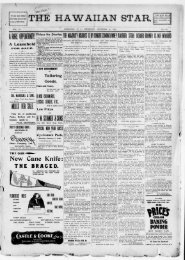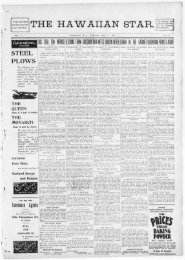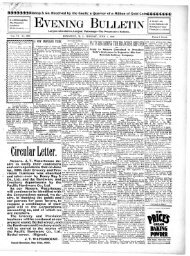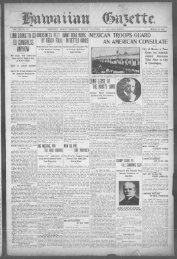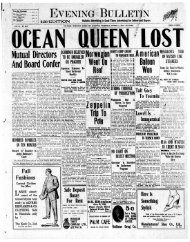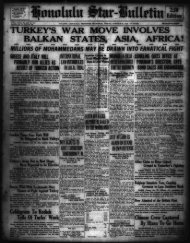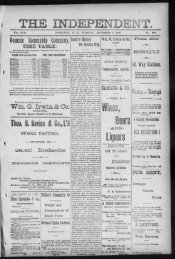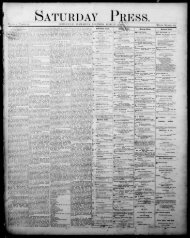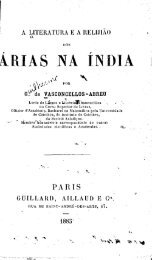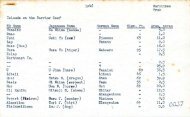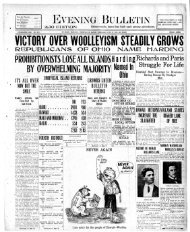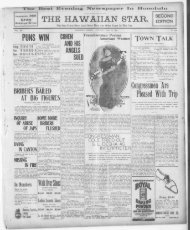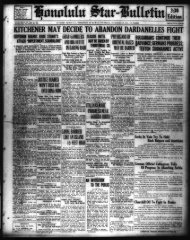You also want an ePaper? Increase the reach of your titles
YUMPU automatically turns print PDFs into web optimized ePapers that Google loves.
VI.<br />
It<br />
I<br />
1'<br />
I<br />
.<br />
!'<br />
sv<br />
;<br />
ft<br />
,.4 ..- -.<br />
n aft-- i<br />
"t-- r'<br />
yllwittUttCettt<br />
MMI-WMKL- Y.<br />
WHO, TUHSDAYB AMU FRIDAYS<br />
"W. N. ARMSTRONa, EDITOR.<br />
MUDAT. ..OCTOBER 27, 1899<br />
FACE THE DIFFICULTY.<br />
The crowded condition of the harbor<br />
TtwUi to the old knmaalnas the days<br />
the whale ships to the number<br />
i several occasions of 150 laid so near<br />
ach other than ono could walk<br />
tho harbor by stepping from<br />
vessel to another. Sailors to the<br />
lumber of 3000 at times filled the<br />
streets and temporary brothels were<br />
aracted on tho stretches of vacant land<br />
from the rear of the<br />
resi-<br />
dence to tho foot of Punchbowl, and<br />
targe number of native houses, If not<br />
the majority of them were given up to<br />
tetany. The saloons were many and<br />
Honolulu was one of the vilest sea-jaw- ts<br />
of the world. With the gradual<br />
withdrawal of tho whaling fleet tho<br />
conditions improved In a measure. But<br />
rco had left Us trail In poison<br />
mi 4mth over the natlvo race.<br />
Ion Is now to repeat tho un- -<br />
MWT7, demoralizing conditions which<br />
prevailed during the visits of the whal-<br />
ing fleet. Only a study of the sea<br />
ports of the world will enablo one to<br />
realise the undue and disproportionate<br />
growth of the social evils, which com<br />
merce creates In them. Tbero will be<br />
in the futuro a steady lncrcaso of<br />
demoralizing conditions, nnd the laws<br />
caanot prevent It here, as they can-<br />
not, and do not prevent It elsewhere.<br />
Honolulu Is u Federal port, and its<br />
Government will sooner or Inter pass<br />
Into the hands of men who will not be<br />
governed by any "missionary" tradi<br />
tions. Commerce will dominate. Tho<br />
ray and tho navy will soon bring<br />
to us moro residents than the entlro<br />
Anglo-Saxo- n adult population of tho<br />
place. The enlisted men will not be<br />
of a class that will take Interest in the<br />
moral progress of the place. They will<br />
create an active market for vicious<br />
pleasures. These conditions cannot bo<br />
changed, but must bo accepted.<br />
It would be a great benefit to the<br />
moral condition of the city If Pearl<br />
Harbor should become the seaport In-<br />
stead of Honolulu, n would draw to<br />
that place the degrading associations<br />
which go into commerce and with gar-<br />
risons. It would leave tho town itself<br />
In a measure free from the vices which<br />
trade brings in its left hand.<br />
But, at present, this Is Impractica<br />
ble. The wisdom of tne hour Is to<br />
put vice where It will outwardly bo<br />
the least offensive.<br />
Here at once arise tho moralists who<br />
declare that the regulation of vice of<br />
any kind is an admission of its right<br />
to exist. But the world Is gradually<br />
coming to tho conclusion that abstract<br />
right Is a poor weapon, but an excel<br />
lent maxim. John Morloy In ono of<br />
his thoughtful essays says, the British<br />
nation declares for tho right, but sus-<br />
pends the right If it interferes with<br />
reaching a definite and temporary<br />
gOOd.<br />
Compromise Is the condition of suc<br />
cess in worldly affairs. Government<br />
is Itself a compromise. Abstract jus<br />
tice is not common. It is tho Ideal,<br />
towards which all things slowly movo.<br />
Those who are sensltlvo about com'<br />
promising with evil will recall the fact<br />
that tho Lord "compromised" with<br />
Solomon, and permitted him to have<br />
seven hundred wives and threo hun-<br />
dred, concubines. Nowhere- - does He<br />
order Solomon to reduce the number.<br />
It to. be presumed that the "prin-<br />
ciple" of polygamy was a bad ono,<br />
but tho Lord did not order It to be<br />
discontinued, but merely pointed out to<br />
the wise man that his wives wero lead-la- g<br />
him after false gods. Tho sugges-<br />
tion was that he should regulate them.<br />
Judicious compromise) should bring<br />
ua nearor by each step towards ab-<br />
stract right, and such Is the history of<br />
evolution for good.<br />
THE AMHK1CA.MS AND THE BOERS.<br />
As war actually exists between tho<br />
British and the Boers, tbero arises a<br />
curious study In inherited prejudices<br />
of nations which is displayed In their<br />
attitude towards tho combatants. Tho<br />
Oermans, naturally sympathize with<br />
the Boers, Tho French also, becauso<br />
they halo pcifhlluus Albion. Tho litis-- 1<br />
slans aro totally indifferent to British,<br />
lupauslon In South Africa, provided<br />
Russia is not molest oil lu her own<br />
schemes of expansion.<br />
As to tho Americans, there Is no<br />
unanimity of BOiitlmout. Tho i'lag<br />
wavers, who Inherit it strong Impulse<br />
to twist thu tall of the l.lou on every<br />
ouowlon, even f tho Moil aid hiiln<br />
Dewey's lleut to supplies, contrary to<br />
tho laws of neutrality, iiiiiathUu wlih<br />
tho loern of course, IMwunl Atkinson<br />
nnd the class to which he belongs,<br />
In tlin laiisu of thu Hour, boemua<br />
lii-- v am tint friend of self myorn<br />
wit, huwur ruotiiii, r ,,irm<br />
It way be, Tln-r- sre itlwi maiiy Am i<br />
leans wuu am jnclliitt.1 in tiitnk Hut<br />
Hots sru a iiob, dixtjdy ru,<br />
tp,""iTit""r"<br />
IjsT ;it<br />
ASSHiajyTO<br />
tlous and intelligent people who act<br />
ustly towards all men, and are about<br />
,o bo crushed by the avaricious Brit<br />
ish. There nro also a largo and per-ba-<br />
tho largest class of intelligent<br />
Americans who look behind the pro-<br />
fessions of tho Boers, and see that they<br />
are a minority of the capable residents<br />
of the Transvaal, and that Instead of a<br />
Republic, there exists only a narrow<br />
and despotic oligarchy. They see that<br />
tho policy of the British In Africa la<br />
tj establish strong colonies with uni-<br />
versal suffrage, placing every resident<br />
of whatever nationality upon the same<br />
footing as tho British themselves, just<br />
as they have done In Canada and Aus-<br />
tralia. They seo that It Is better for<br />
Africa, better for tho world, that bo-fo- ro<br />
a large white population exists In<br />
Africa that Anglo-Saxo- n Institutions<br />
be established thero onco for all time.<br />
Instead of delaying tho Inevitable<br />
strugglo to a timo when an army of a<br />
quarter of a million of men in arms<br />
must settle It, with blood and Iron, It<br />
is better to settle It now and forever,<br />
with a less number, and with a smaller<br />
sacrifice.<br />
The policy and conduct of the Boers<br />
towards the intelligent Outlanders Is<br />
tho same as that of tho British King<br />
towards our own ancestors which pre-<br />
cipitated tho Revolutionary war. The<br />
Boers do not Intend to let tho Outland-<br />
ers rule the country, however numer-<br />
ous and Intelligent they may be.<br />
As to the doctrine of self Mile, we<br />
Americans are wisely and bravely dis-<br />
carding It, unless education and intel-<br />
ligence undcrllo it, and wo aro not<br />
preaching about it from tho house tops,<br />
but aro making It manifest In Luzon,<br />
Porto HI co and Cuba. As tho Boers<br />
have settled down to a permanent dis-<br />
crimination against the most precious<br />
beliefs of tho Anglo-Saxo- n race, thero<br />
romalns but ono course only by which<br />
to correct thoir errots, nnd that course<br />
tho British are taking.<br />
When the Boers, in tbolr greed for<br />
money, permitted and encouraged tho<br />
Intelligent Outlanders to enter, reside<br />
und Invest an enormous amount ni<br />
capital In the Transvaal, there arose<br />
an unwritten contract between the par<br />
ties, that tho Outlanders, if they were<br />
good nnd responsible cltlzeiiH, should<br />
have some, political rights. Tho con-<br />
tract Is broken and tho British will<br />
now enforco It. The serious people<br />
ot America, reluctant as they nro to<br />
approve of tho uso of force, will give<br />
tbelr sympathy to tho British In the<br />
execution of their wise policy of lap-<br />
ping tho world with just nnd whole-som- o<br />
laws.<br />
ANNEXATION OF CUBA<br />
The movement tar the annexation of<br />
Cuba is quiet but continuous. The pro<br />
moters of It avoid, at present, exciting<br />
public discussion over It In the States.<br />
Americans contlnuo to invest heavily<br />
in cane nnd tobacco lands. Senator<br />
Park of Michigan and Congressman<br />
Hawley are promoting several largo<br />
corporations which own extensive<br />
tracts of land. The Cuban Land nnd<br />
Steamship Company has purchased 30,-0-<br />
acres of land and Invites American<br />
farmers to scttlo and Join in<br />
cano cultivation. Tho promoters<br />
claim that they have already 3000<br />
American Investors.<br />
The scheme for annexation Is a slm-pl- o<br />
one. The people of Cuba are to be<br />
gradually taught that there Is great<br />
profit In annexation and no profit with-<br />
out It. It Is believed thnt any senti-<br />
ments the Cubans have in favor of In<br />
dependence will yield to tho argument<br />
of the pocket.<br />
While Congress has pledged Itself to<br />
iralntain Cuban Independence, It has<br />
not pledged Itself to refuse nnnex-.itlo-<br />
If tho Cubans ask for It. '<br />
Ah annexation means tho introduc<br />
tion of Cuban products, especially<br />
sugar nnd tobacco, Into the States, free<br />
of duty, tho annexation movement will<br />
bo a popular ono In Cuba, and tho most<br />
ignorant part of the population will<br />
gradually favor it.<br />
Several years will pass before this<br />
movement takCB an effective shape.<br />
When It does, tho question will bo be<br />
fore tho American people, whether It<br />
will annex a territory, whoso products<br />
will compete, with thoso of the several<br />
States. Tho strategic and commercial<br />
value of Cuba Is admitted. But, aro<br />
theso advantages offset by tho disad<br />
vantages of competition? Tho Ameri-<br />
can farmers of tho Mainland will In-<br />
sist on "protection." So also tho Amer- -<br />
lc!l fnnnerb who hcttlo in Cuba will<br />
demand equal "protection."<br />
While the Democratic party favor<br />
two trade, It opposes tho policy of nn- -<br />
nexntlon, which Is virtually n policy<br />
which protects homo Industries. Tho<br />
Itopiibllcau party favors protection nnd<br />
opposes frco trade, hut It can hardly<br />
psenpo from tint effect of expansion,<br />
which Is substantially free trade with<br />
tho people, of Us own territories or<br />
t'OlonliH<br />
Tin eoimervntlvtt East Is opposed to<br />
movement which raUe theso perplex.<br />
Inn questions, Thu radical Went Is<br />
In favor of thu uxpaiulvu miiveiiieiiU,<br />
thouuli lliwii movements imU mrileik.<br />
IHK problems, Tim Wet U therefore<br />
iKi.'alyirinK for fi'ini limit), This<br />
U Jim- -<br />
what thu lr)Uh nUlumsieii dn.<br />
clarrd uouU bo liu f fleet "f fkaii"<br />
lion,<br />
THfOliD HAY<br />
Thero Is a pretty picture of life li<br />
.he colonial days, which somo one hat<br />
drawn In "An Old Virginia Correspon<br />
dence," and published In the Atlantlt<br />
Monthly. The young people, wh(<br />
should read It, will find that with al<br />
of the Innumerable accessions bt<br />
modern Improvements, brought to ui<br />
In these laterdays by tho restless in-<br />
ventors and promoters, the human<br />
heart boats as it did of old, nnd It<br />
finds none of these marvelous modern<br />
conveniences add much ecstasy to Its<br />
beatings.<br />
These letters nro occasional, and<br />
coven a long period. ...iss Millard<br />
Smith who lives in Yorktown, Va.,<br />
and Is only sixteen years of age writes<br />
In 1780, to Miss Betsey Ambler who Id<br />
only fifteen years of age, and lives n<br />
Richmond, Va. Miss Mildred shows Jn<br />
her letters the high breeding and form-<br />
ality of a Virginia girl, and tells Iter<br />
friend that the French war ships, un-<br />
der Count Rochambcau (the time was<br />
Just before the surrender of Cornw.il- -<br />
Us), aro In port, and she confides to<br />
Miss Betsey somo observations<br />
e<br />
affairs. Miss Betsey, aged fifteen, re-<br />
plies at length In cholco and stately<br />
language, which few of tho college<br />
bred girls of today could excel. She<br />
tells Miss Mildred that she had been<br />
to n ball at tho Palace In Williams-burg- h,<br />
and "played off a tnousand airs<br />
which would have provoked a lecture<br />
from you an hour long." And then<br />
sho speaks of ono Marshall who was<br />
devoted to her sister at tho ball. Miss<br />
Betsey's father, Richard Ambler, wa3<br />
first treasurer of Virginia, and with<br />
his numerous family of girls, Is driven<br />
from Richmond Into tho mountains, by<br />
Tarlcton's raid through tho State.<br />
Bravo Miss Betsey writes without any<br />
excitement to Miss Mildred, about tho<br />
pursuit by tho British, the living In a<br />
hovel, tho concealment of her father.<br />
Do these girls of Honolulu realize<br />
what It means and 'how misfortune was<br />
hammering Into flno gold tho metal In<br />
tho souls of theso gentlo Virginia girls?<br />
Miss Mildred, within two years, wrltM<br />
again u polished, stately nnd loving<br />
letter, In which she wishes sho could<br />
guard her friend from Juvenile, extrava-<br />
gances, to which sho Is prone. Then<br />
Miss Betsey In 1785, writes of her own<br />
loo affairs, but soon after follows<br />
with a letter which describes her recent<br />
Liarrlago to Col. Brent, nnd with path<br />
etic words tells her of his Btidden death.<br />
Then fourteen years pass. Miss Betsey<br />
has again married and to Col. Carrlng-to- n,<br />
a friend and army comrade of den.<br />
Washington. Sho now writes to her<br />
sister Nancy, In 1799, from Mount Ver-<br />
non, whero sho and her husband are<br />
tho guests of Gen. and Mrs. Washing-<br />
ton. She gives a charming picture lof<br />
tho Wnshlngtons' home life." Sho<br />
visits Mrs. Washington's room. "On<br />
ono aide sits thn chamber-mai- d with<br />
her knitting; on the other side a little<br />
colored pet learning to scw;a decent<br />
old woman, with her tables and shears,<br />
cutting out tho negroes' winter<br />
clothes; while the good old lady (Mrs.<br />
Washington) directs them all, inces-<br />
santly knitting herself, nnd pointing<br />
out to me several pairs ot nice colored<br />
stockings and gloves she has Just<br />
finished, and presenting me with a pair<br />
half done, which she begs I will finish<br />
and wear for her sake." Tho formiV<br />
Miss Betsey, now Mrs. Carrlngton,<br />
visiting In the homo of one of the fore-<br />
most men of his age, continues In her<br />
letter referring to tho Wnshlngtons<br />
that It was "but ono year" since they<br />
wero forced to sacrifice, all these Inno<br />
cent, delights, which aro so congenial<br />
to their years and tastes, to the Parade<br />
of tho Drawing Room and Levee." Tho<br />
women who aro trying, with the aid<br />
ot money, to get some smalt measure<br />
of pleasuro out of these modern days,<br />
will notlco that ...rs. Washington calls<br />
Uiose days of home delights which thelj<br />
wero forced to give up for tho Presi<br />
uenttai Mansion, tho "lost days!" mis<br />
raro letter Is fascinating. But a portion<br />
of it is torn off. Let us bo thankful<br />
for what remains. Ahd tnen Mrs.'<br />
(Betsey) Carrlngton, on her return to<br />
Richmond writes to her sister Nancy<br />
ot tho earlier years of their lives, of<br />
their Infirm mother, andof their father;<br />
for notwithstanding tho father<br />
"held nn olllco which afforded llttlo<br />
leisure for such employment, every<br />
hour from business wis devoted to us,"<br />
And ho educated tiitso courtly Vir-<br />
ginia girls. But sho writes; "Tho Rod<br />
at that tlmo was un Instrument never<br />
to bo dispensed with, and our dear<br />
father used It most conscientiously,"<br />
Sue nlso writes; "Wo wero forced to<br />
Industry, to appear genteelly; to study<br />
manners to supply thn place of educa-<br />
tion," She mentions Incidents which<br />
Interest every American who knows<br />
and roveri'iires the character of thn<br />
Marshall, firm Chief Jiutlcu<br />
of thn Culled States Hit wi a raptuln<br />
III Um uriny, und had taken n three<br />
months iHiurnu of law minly. Mrs Car<br />
rlliRlon write Unit lut wan tpecicd<br />
In iiiv,n( ami ull of (liu KlrM wanted<br />
lo sihi him, When hu urriw'il her<br />
winner iiier Mary, wuy fount n<br />
)i'ur of Hue, "m htr rap fur him,"<br />
"Hut I," w) Mr, l!rrliintuii, "M<br />
desire of txwtalag aaresaMe In Ma<br />
Mrs when I beheld his awkward<br />
figure, unpolished msnaers, and total<br />
negligence of parson, which, by the by,<br />
did often produco a blush on her<br />
(Mary's) cheek. Nevertheless, how<br />
trivial now seem such objections!<br />
Under the slouched hat, there beamed<br />
an eye that penetrated at ono glance<br />
the Inmost recesses ot tho human char<br />
acter." Young Marshall married<br />
Mary. This young girl only fourteen<br />
years of age In her girlish fun, "sot<br />
her cap" for an unknown young man<br />
who had studied law only three<br />
months. The French wit said, "matri-<br />
mony Is a sea for which there Is no<br />
compass," but she seemed to have<br />
found one, which guided her to one<br />
who stands only second to Washington<br />
In the reverence of his countrymen.<br />
Ono contrasts tho lives of these<br />
country girls, simple and Industrious,<br />
and without tho aid ot modern appli-<br />
ances, with the hot, feverish and dis<br />
contented living of modern days, and is<br />
tempted to ask what are tho uses of the<br />
achievements of modern Progress?<br />
And the answer is, that this Is a transi-<br />
tion period, which will bring men and<br />
women Into better harmony with that<br />
simple order of life which the Wash- -<br />
Ingtons' loved.<br />
THE PRESIDENT'S BKSPONSI- -<br />
BILfTY.<br />
Tho Executive In Washington Is<br />
placed In a delicate position, regarding<br />
tho labor questions which have arisen<br />
here. While the Newlands' Resolution,<br />
so far ns that document, containing<br />
general and In somo respects vague<br />
langunge. Is concerned, permits Ha<br />
waii to "assist" Immigrant labor, there<br />
still remains decidedly tho spirit<br />
though not tho letter of tho Federal<br />
law which forbids it. As tho President<br />
has assumed tho power to suspend our<br />
laws, as ho has dono in tho election<br />
case, he Is open to the'cliargo by his<br />
enemies of not suspending our assisted<br />
Immigration laws, so that neither Asia<br />
tics nor Europeans can bo aided to reach<br />
theso Islands. While the protection of<br />
our own Interests justifies him In per-<br />
mitting us somo latitude or privileges<br />
In securing labor, during tho transi-<br />
tion period, it may not help him In<br />
carrying his political responsibilities.<br />
Congress, especially tho Democratic<br />
party, will attempt to hold the Pres-<br />
ident responsible for the policy pursued<br />
by his officers In tho local government.<br />
Congress will not attempt to holu tho<br />
local government or tho planters to<br />
account for any violation of tho spirit<br />
of tho American laws. Tho President<br />
has, according to hie own Interpreta<br />
tion of the Resolution, arbitrary power<br />
In our affairs and tho whole respons-<br />
ibility ot what Is done here will be put<br />
upon him.<br />
. Tho lack of a good representative in<br />
Washington, from the hour of annexa-<br />
tion until tho transition period Is com-<br />
pleted, Is a deplorable blunder. No one<br />
can bo held especially responsible for<br />
It. The public sentiment of tho mer<br />
chants and the sugar Interest has been<br />
Indifferent about It, nnd tho govern-<br />
ment has been crippled by a task of<br />
appropriations. An active representa-<br />
tive, acceptablo to the Washington<br />
authorities, would have prevented theso<br />
misunderstandings wu.ch have latoly<br />
occurred.<br />
UOOD FOOD.<br />
If one-ten-th of tho time spent in talk-<br />
ing and writing about tho wonderful<br />
products of this Paradise of the Paci-<br />
fic had been spent in actually produc-<br />
ing some good fruit and vegetables,<br />
wo would today have an attractive<br />
vegetable and fruit market. Our case<br />
I3 that of Col. D who was a noted<br />
writer in tho Rural New Yorker on<br />
tho raising of pigs. Tho readers ot tho<br />
paper, with tho usual credulity of tho<br />
readers of newspapers, assumed that bo<br />
was a King among hog "growers. But<br />
one of them, desiring to grasp the hand<br />
ot this eminent cultivator, traveled<br />
many miles to visit him. He found<br />
tho writer engaged In doctoring an old<br />
and sickly sow, which was tho solo<br />
occupant of his pen, and being forced<br />
to a confession, said that hog-farml-<br />
on paper was his gift, and ho should<br />
sternly resent any Intlrritlon that ho<br />
needed 'to qualify ns a. writer by be<br />
coming an nctual hog raiser. When-<br />
ever tho tourist has Innocently asked<br />
to seo tho lino productions of our soil,<br />
ho is pointed to pine-app- le and bana-<br />
nas, but after that, tho pointing Is dono<br />
In a vaguu nnd general manner, and j<br />
I<br />
attention Is not called to tho Imperfect<br />
products of thu Chinese gardens.<br />
Hut thero Is n ray ot light In tho<br />
horticultural world. Mr, Ixivokln is<br />
raWlug on Tnntnlus, at 1111 elevation of<br />
ICOO fevt, tho genulno sugar com,<br />
known ns tho "Karly Minnesota," The<br />
ears uru largo, nnd tho kernels nro not<br />
surpassed In slzo by thtt best yields of<br />
(his kind of cunt In the eastern States,<br />
Tim HuMir ami the tcuderiie um tho<br />
siliuo its are found in tno e.inttru inru,<br />
Corn In a Iroplcul plant, and should ho<br />
found hern In perfect condition. It<br />
U not known hiher Mr. Utyekln lm<br />
ie.nrlf'1 to any ciuitno nuHliods fur<br />
wiirlPK Mill, uniwlh, eelr he may<br />
,amsfjaaiimnti wu)mfcfct.iwfcitwniniP't'iww'W-'- i<br />
I<br />
Almost Blind<br />
toratwta Affect Mm IfM-MM- M<br />
Ny Tracts k an cuHat With<br />
ut RaHaf-- wt New Ha la WM.<br />
" Wbea my little bey was three months<br />
old his eyes became very sere aad he wat<br />
almost blind. I took him to an arallat<br />
who tresUd him for six months, and left<br />
him as had as he was at the beginning.<br />
Finally Hood's Bsnaparllla wss recom-<br />
mended and I begsn giving It to htm.<br />
la less than three weeks he wss ablt<br />
to go Into the sun without covering<br />
his eyes, and today his eyes are perfectly<br />
well, and his ears and nose, which wert<br />
badly affected, are also well. Hood's<br />
Sarssparllla has certainly done wooden<br />
tor my boy." Mas. Jambs H. PAiimcn,<br />
Amador, California. Remember<br />
Hood's<br />
SarsaparillayE;<br />
Pnrlntr. All drmglito. IMlx tor 13. QetHood's,<br />
are the only pills to Ukf<br />
HOOd 8 PHIS wtth Hood's Baruptrllla<br />
Maunawlll, where water-melo- have,<br />
It is said, been grafted with much suc-<br />
cess on tho ohla tree, and sugar cano<br />
tatoons for twenty years when grafted<br />
on Hilo grass.<br />
Every State and Territory has an<br />
annual agricultural or horticultural ex-<br />
hibit. Hawaii has none, because there<br />
is no public Interest taken In the mat-<br />
ter.. Llko tho people of Southern Cali-<br />
fornia, wo have given over theso mat-<br />
ters to tho Asiatics, and aro rather<br />
proud of our degradation.<br />
There are individual cases of success<br />
In raising excellent vegetables, but the<br />
averago taste seems to bo as low as<br />
that of the old darky who measures<br />
all food by tho standard ot "hog and<br />
hominy."<br />
HAFTIBH BY KIKE.<br />
A new religious sect hns appeared<br />
In Pennsylvania, who bellevo in Bap<br />
tism by fire. Tho leaders are sincere<br />
men, and many of tho prosperous tar<br />
mers have been converted to the now<br />
doctrine. It Is said that the fire des<br />
cends from Heaven in tongues, and<br />
leaves marks upon tho face, arms and<br />
hands. It Is claimed by the leaders<br />
that faith will do all things. A well<br />
developed faith, it Is urged by thoir<br />
preachers will enablo human beings to<br />
fly.<br />
Theso converts aro honest and steady<br />
farmers. If Mr. Damon falls to secure<br />
Italian Immigrants, ho may be able to<br />
secure a colony of theso thrifty but'<br />
singular people. They are well adapt'<br />
ed to settlo on tho plantations ad'<br />
joining Mauna Loa. Volcanic out<br />
breaks will furnish them SDeclal ban<br />
t'lsmoffire, and, as tho more hey are<br />
roasted or scorched, the more devout<br />
and faithful they will be, thero will<br />
be no danger of their abandoning tho<br />
plantations.<br />
As those believers In Baptism by Are<br />
are admirable men with tho hoe, somo<br />
extraordinary effort should bo made to<br />
furnish them with samples of such flra<br />
a3 wo possess, and offer it free with<br />
a half abre of land.<br />
YYATCHlXfri ,THE EXPERIMENTS<br />
Tho Department ot Agrlculturo in<br />
Washington calls tho attention of the<br />
American, farmers to tho results of the<br />
West India Royal Commission for the<br />
examination ot tho sugar Industry.<br />
Tho Bulletin of the uepartment sum-<br />
marizes tho measures which have been<br />
taken, to reviso the Industry, and placo<br />
It on a basis ot "scientific methods and<br />
common sense." The Bulletin also<br />
calls thp attention of the people to this<br />
important undertaking, and says, "It<br />
will bo a matter ot much interest to<br />
tho people of this country, especially<br />
In view of our interests in islands ad<br />
jacent to those for whose benefit it was<br />
established."<br />
Tho Department of Agriculture in--<br />
tomls to take advantage of tho annual<br />
.appropriation of $90,000 per year by tho<br />
Imperial Government, and whatever<br />
discoveries aro .made, or methods<br />
adopted in cheapening tho production<br />
of sugar, will he reported to tho cano<br />
growers of Cuba and Porto Rico.<br />
For Kuplolunl'a Coffin.<br />
By tho Australia tho plato for tho top<br />
of tho casket In which tho remains ot<br />
tho Into Queen Dowager Kaplolanl will<br />
finally reposo was received. It Is ot<br />
silver and beais tho following inscrip-<br />
tion in Hawaiian:<br />
KAPIOLAM NAPKLAKAPU,<br />
Wahlne a ka Moi Kalakaua.<br />
Hanau ma Hllo, Hawaii, I ka la 31 o<br />
Dokcmalia, M. 11. 1834.<br />
Mako ma Honolulu, uanu, 1 ka la 21 0<br />
June, M. If. 1899.<br />
64 Mnknhlkl, 5 Maluma a me S3 lot,<br />
Tho crest Is of solid gold with enam-<br />
el work laid on, It Is surmounted by<br />
the royal crown and boars the, motto;<br />
"Kullu I Knnuu," On tho face of the<br />
ertut aro the letters KK,<br />
MUM Kiniiiini Hk-c- t (.Umiuiii,<br />
MU Jiitfitphlno rlluiitoii, tho prima<br />
donna, of thu llo.lon Lyric Operu'Coin- -<br />
pany, Henry Jlallmii und Colonel<br />
Thompson nnd wife enjoyed thu pir- -<br />
nirinsntoor Mr, i;ieuieni m not a im<br />
I I'" '" '<br />
f .'7" "'?<br />
hat oblalnrd obi valunbl ut f our of l eyvi during IN -l-<br />
ions from th iprlwn( station nr. pint,<br />
ifYalaw- njmm.j tf " - 1 ,frto k ..fl iljinljfal ,tf hlMiiimtfli'r ami it H<br />
- . .<br />
HAWAIIAN FLOATS<br />
Seen in Proceuion at<br />
Kansas City.<br />
On the Ocoaslon of the Thirteenth<br />
Visit of Pallas to Her<br />
ta<br />
City.<br />
At tho recent celebration in Kansas.<br />
City, In the magnificent parade which<br />
characterized the thirteenth visit ot<br />
Pallas to her chosen city, a large num-<br />
ber of magnificent floats appeared.<br />
Among them were:<br />
VOLCANIC GLORIES OF HAWAII.<br />
The largest volcano In the world,<br />
which was recently acquired by tho<br />
annexation of Hawaii, is pictured in<br />
flaming eruption. It is by far the most<br />
expensive float of nil, being made en-<br />
tirely of asbestos and built to give the<br />
greatest spectacular feature of the pa-<br />
rade. As it passes through the streets<br />
It will vomit forth lire and smoke with<br />
vivid lava streaming down Its serrated,<br />
sides. It requires five men to work<br />
effects of this float and<br />
enough fireworks will be consumed<br />
e<br />
a Fourth of July celebration tor<br />
all of Kansas City.<br />
RAINBOW FALLS OF HILO.<br />
A beautiful conception is that rep-<br />
resenting the Rainbow Falls ot Hllo,<br />
which Is one of the greatest sights to<br />
tho stranger. In Hawaii. A noisy,,<br />
foamy river is seen rushing down<br />
through rocks, while a cloud of vapor<br />
gives the rainbow effect.<br />
ANCIENT IDOLS OF HAWAII.<br />
The ancient idols ot Hawaii, hideous,<br />
misshapen and terror-inspirin- g, have<br />
renounced their evil proclivities, and<br />
now join In the pleasure-lovin- g pur-po- so<br />
ot tho Goddess Pallas. They rep-<br />
resent the period in America's Infant<br />
colony when the natives of Hawaii<br />
worshiped tho gods through Idols In<br />
conformity with their Idea that the<br />
gods were cruel and passionate and de-<br />
lighted In human suflerlng.<br />
NEW TRAINER FOR STANFORD.<br />
STANFORD UNIVERSITY, Oct. 17.<br />
A surprise was sprung last night by<br />
tho baseball and track management in<br />
the appointment ot W. H. Murphy, the-prese-<br />
football trainer, as baseball<br />
coach and trainer for the track team.<br />
Murphy was desired by tho University<br />
of Pennsylvania to coach the baseball<br />
nine, and the Executive Committee or<br />
the student body here had to offer a.<br />
flguro to secure his servlo?s.<br />
"Doc" Murphy hns an enviablo re-<br />
cord on the diamond. He played four<br />
years on the Yale team, filling the posi-<br />
tion of captain in his junior year.<br />
During the season of '94 and '95 bo<br />
played shortstop tor tho .New York<br />
Giants. Here he was popularly known<br />
as "Midget" Murphy, on account ot hta<br />
stature. The last two seasons he has<br />
been engaged as coach for the Univer-<br />
sity ot Pennsylvania, and has had phe-<br />
nomenal success. Mi'rphy has played<br />
every place on the New York team, ex-<br />
cept tho battery positions and first<br />
base. Ho Is said to be the best col-le- go<br />
coach of the American national<br />
game.<br />
As a trick ,mnn Murphy Is also valu-<br />
able He has gained much from help-<br />
ing his noted brother, Mike, and Is<br />
thoroughly familiar, not only with tho<br />
conditioning of men and all that it<br />
Implies, but can also glvo track men<br />
pointers.<br />
Murphy la modest and affable, and s<br />
already exceedingly popular with every<br />
ono with whom he comes In contact,<br />
especially athletes. He Is a qualified<br />
physician, being a graduate of the<br />
Pennsylvania Medical School.<br />
BIG RUSH OF SUGAR BEETS.<br />
Hundreds ot Tons Dally Reach the<br />
Salinas Refinery.<br />
SALINAS, Oct. 17. Some Idea ot tho-rus-<br />
at the Spreckels sugar factory<br />
may.be gained from the knowledge<br />
that several extra freight tralna have<br />
been coming and going dally over tho<br />
Southern Pacific tracks for some weeks<br />
past. Yesterday an extra with twelve-gondol-a<br />
cars' ueavily laden with bceta<br />
arrived In the forenoon. The cars car-<br />
ried 360 tons of beets, and thin was.<br />
only a small portion of tho dally re-<br />
ceipts. Then tho northbound oxtru<br />
freight takes away daily from six to<br />
seven carloads of sugar to the roflnery<br />
ht San Francisco. This output will av-<br />
erago about 160 tons dally.<br />
Two big freight and passenger ships-ar- e<br />
being built at Nowport News for<br />
tho Pacific Mail Lino by tho Newinirt<br />
News Shipbuilding and Dry Dock Com-<br />
pany. The length of each Is SCO foot:<br />
breadth, molded, 03 feet; depth, molded<br />
to upper deck, 40 feet; low draft, 27<br />
feet; load displacement, 18,600 tons.<br />
Each vessel will hnvo a cargo capacity<br />
of 610,000 ciihlo feet and bunker capa-<br />
city of 210,000 ruble feet, Each will<br />
accommodate 'i llrat'dass pasonger<br />
and 1,200 steerage pinneimern, and will<br />
also luivo ciiTommoduiloiu for officer<br />
nnd crew of ISO men, Tnu wU un<br />
lo In Unit Hum In wery respect und u<br />
have a spued of eighteen knots, They<br />
will bu completed In llhmit fifteen<br />
moiitlm,<br />
In udillllmi u Um In rue. mirk or<br />
J. T, Watvrhousu, (hu Pacini) )urdwsii<br />
Comptuy have lately added flessat<br />
lined Of IkHiltiiii, MII)(ou Olid JUvll'J<br />
wnr, rruekery and lumpi, Jiuanu<br />
(Man and UcijuntJ wn,<br />
i<br />
ti<br />
J<br />
i


